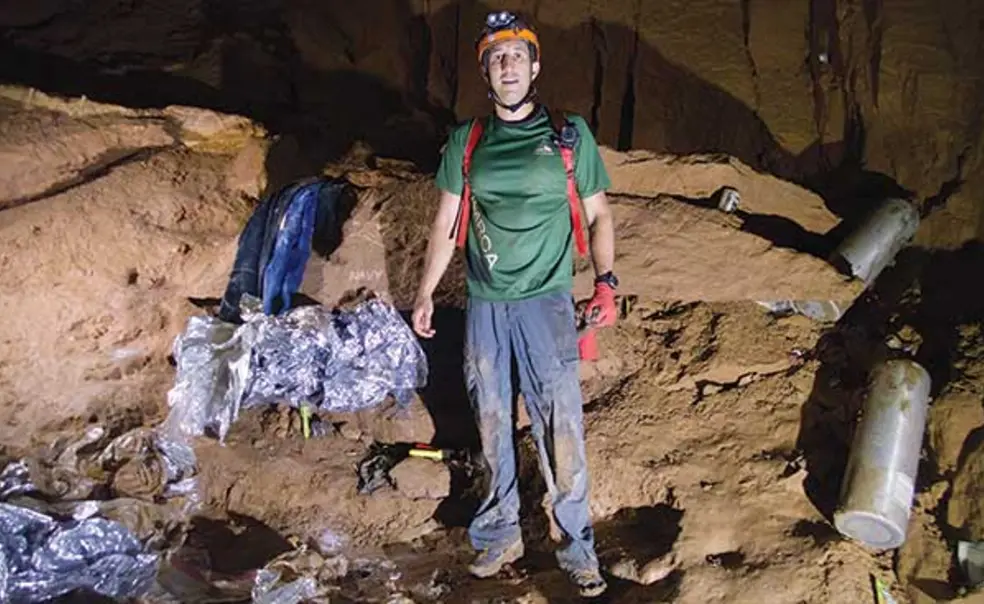Josh Morris ’99: Race Against Time and Tide
Caving expert turns communications liaison to help save a trapped soccer team in Thailand
When Josh Morris ’99 arrived at the cave in northern Thailand where a group of 12 young soccer players and their coach were trapped by a flash flood last summer, he wasn’t planning to stay long. It was about a week after the boys had entered the Tham Luang cave, and Morris, who owns a rock-climbing, caving, and rescue company in nearby Chiang Mai, had already sent equipment, staff, and support. His brother-in-law, a highly trained rescue caver who was one of the first on the scene, had began to express frustration with the lack of coordination among the thousands of rescuers, so Morris drove to the site to see if he could help.
Morris initially worked with groups of American and Thai military service members, exploring caves that might lead to the boys without having to rescue them by diving. But as time passed, it became clear that diving was the only way out — and the situation was growing more dire by the hour, with the boys and their coach living a mile and a half inside the cave, with limited supplies and falling oxygen levels.
Morris began to realize how much coordination and communication would be needed — among high-ranking Thai military officials, the U.S. Air Force, and divers from several countries.
“I began to recognize that my role should really be a liaison because I had that necessary cross-cultural experience,” Morris says.
In the tense days that followed, as a plan was devised, Morris began to feel as though he had been training for this task since he arrived in Thailand nearly 20 years earlier as a Princeton in Asia fellow teaching English at a local university. A longtime rock climber who grew up in Utah, Morris quickly fell in love with Thailand. He decided to stay after his fellowship and build a climbing wall. Eventually, he married a Thai woman, founded a cross-cultural climbing-and-caving business, and became fluent in Thai language and culture.
“There’s a Thai word that effectively means ‘connector’ — it’s the same word you use for welding,” Morris says. “People were saying I was the connector because they could come to me and I could understand them — I could communicate what they were saying effectively to others who didn’t share their language or way of doing things.”
A complex mission was planned, which involved sedating the boys and taking them out in scuba gear, navigating swift currents, and traversing narrow, muddy paths with poor visibility.
Every day, Morris would wake up at dawn and collapse into bed at midnight. In addition to his work as a liaison, his team worked in one of the dry chambers to build and manage a rope bridge across uneven boulders and unstable terrain to carry the boys to safety after the dive portion of the rescue was complete. Finally, the last of the boys emerged from the cave.
After a visit with his family in the United States, Morris returned to Thailand, where last September he received a prestigious honor from the king of Thailand for his role in the rescue effort.
Since then, he’s been using his newfound connections with high-ranking Thai government officials to expand his company’s sustainable-tourism projects and build adventure-tourism opportunities in partnership with local communities.
Adventure travelers, Morris says, look for activities like mountain biking, caving, and climbing — and if they travel to underserved areas, they can support new business opportunities like hostels and restaurants while encouraging communities to develop natural resources sustainably. Morris is working to create an outdoor-adventure program that combines history and sustainable agriculture in a Thai community that sees relatively few tourists.
One of his final acts of the cave rescue before he returned home was to translate for several of the boys’ parents, who wanted to thank the British divers who had brought the boys through some of the trickiest passageways.
“I was on the verge of tears the entire time I was translating,” he says. “I thought, ‘Wow, there were people from all over the world who worked together under tremendous stress to get to this moment, and maybe I also had some effect here.’”












No responses yet